ecosystem
posts displayed by tag

Focus area: Education Solutions and Services
Jun 26 2014China-Finland ICT Alliance and DIGILE activities in education represent the “Learning Solutions” part of the Sino-Finnish Learning Garden (SFLG) that has been initiated by the Finnish Ministry of Education and Culture (MoEC) and being developed in cooperation with the Chinese Ministry of Education (MoE). Working together with the key academic, public and industry partners in both countries, this focus area aims at bringing schools, academia, national research programmes (e.g. the Academy of Finland and Tekes, the SHOKs such as DIGILE), China-Finland ICT Alliance, companies and authorities to join their efforts to co-create modern learning solutions to foster 21st century skills among students in China and Finland. It covers learning research, teacher training and learning solutions, i.e. technology, services, and content, ranging from kindergarten to primary, secondary, higher education and to vocational and professional education.
The DIGILE and China-Finland ICT Alliance activities take place in two main areas in learning solution cooperation:
I EduTech Business Ecosystem: for creating, testing, adapting and scaling innovative solutions in education, involving international business pilots together with Chinese partners. The EduTech Ecosystem is meant for companies.
II EduTech Research Forum: for universities and research institutions, planned to launch in September 2014 (at the Forum on Education Solutions for Sino-Finnish Learning Garden – ”21st Century Learning Skills”).
In addition there are ongoing discussions for setting up joint education Cloud services for R&D&I and pilots in China.
Some observations on online education and learning solutions market in China
Online education and learning solutions area is under an active development both for serving public sector and private sector educational institutions as well as the huge online (and mobile) consumer market in China.There are several major developments and education reforms ongoing or being planned that may provide joint development and business opportunities. Examples of these include the need to deliver education to the countryside, the growing demand of vocational education including in public and private sectors, and the education reforms ranging from Kindergartens to universities that will extensively leverage digital delivery (e.g. the education cloud services, the e-textbook and e-Schoolbag initiative and others).
The Chinese education tradition has emphasised performance in exams at various levels and the major goal for students is the Gaokao national university entrance exams. In June 2014 close to 10 million students participated.There is a call for renewal of the education system to emphasise more open-ended and innovation-driven approaches and the learning of “soft skills” in addition to the “hard facts” as the prevailing education approaches are not optimal for meeting the future needs.
What Finland may bring into play also in the EduTech area is the support for enabling the move towards student-centered approach, complementing the theory and textbook based materials with real-life experiences, and providing solutions for learning the so called “21st century learning skills” in social settings, encouraging experimentation and allowing for failure. The “Learning is Fun” approach promoted by many of the Finnish education experts and EduTech companies can also encourage students to become involved in social and physical activities for learning the “soft skills” and for better wellbeing.
The rapid growth of China’s Internet and mobile user base has continued and the number Internet users in China reached over 600 million by 2013. It is particularly noticeable that since the penetration of (mobile) Internet reached close to half of the population the online education market has grown even much faster. While market growth demonstrates the potential, the field is becoming fiercely competed as market positions are being built. The established players, like New Oriental, face new challengers, including the Internet e-commerce, social networking and games giants, like Alibaba and Tencent, that provide education services and apps stores. Actually, new partnerships are being formed among the players (e.g. New Oriental has teamed up with BesTV and rumoured to also join forces with Tencent).
Some recent trends in the market indicate that parents are prepared to spend even more on the education of their child as the income level has risen. In order to adopt new solutions there should be demonstrated evidence on the benefits, including not only new skills and wellbeing but also maintaining or improving performance in the mandatory tests, when dealing with curriculum topics.
The rural-urban migration continues and will be increasing demand for vocational education and adult education encouraging private investments. Working together with actors involved in the development of the vocational education and well as in the renewal of the university sector, like the development of the universities of applied sciences in China, there will be better visibility to the needs for digital solutions and possibilities to cooperate with their development and large-scale deployment. While cooperating on research and pilots related to education reforms the learning solutions (technology and services) should be considered as a part of more comprehensive Sino-Finnish solutions, involving teacher training, curriculum development so that the learning solutions are integrated, and the development of the physical and virtual (online) learning spaces, including classrooms and complete schools that enable new kinds of learning and also support wellbeing of students.
About the challenges and opportunities in the public and private sector and consumer market
Despite the rapid growth, the consumer market in digital content and services appears to be challenging for international players. For example, the entertainment content, such as movies, music, TV shows and games the models differ from those in the West. For example, in mobile apps and games, the revenues are seldom generated from the downloads but rather in-app (in-game) purchases of value adding services, such as speeding up in the game, getting to next levels, etc. Due to the sheer size of the market experiencing growing demand of learning services in areas such as English language or mathematics, there is a lot of competition, including also free offerings. However, the parents often pay for the solutions if they can be demonstrated to bring progress in learning (e.g. in passing the curriculum tests).
Taking the market environment into account in planning, the offerings and business models will be needed. With quality content and right kinds of partnerships, the consumer market is a viable area. There is a good track record of Finnish game companies to be followed by educational offerings.
In parallel, the public education and private schools markets will be addressable when the appropriate channels are established and solutions certified. Indeed, in the public sector where the solutions are part of the curriculum, the role of education authorities is essential and without being approved to the curriculum it will be difficult to bring solutions to the market. As some parts of the curriculum may be defined at the local level, it will be important to establish cooperation with authorities and education experts who can mandate and carry out special pilots at the City and District levels. In the Sino-Finnish Learning Garden, contacts have been established with Municipal Education Commissions in Beijing and in Shanghai. For a Finnish provider, one school district even in a second tier city may be a major case.
The EduTech Ecosystem – enabling business pilots in China
While there are many interesting learning area comes in Finland they often lack the resources to go alone into new markets, like China. With EduTech Business Ecosystem, representing the learning solutions of the Sino-Finnish Learning Garden, we gather together companies to form business pilots and “clusters” to better to meet the demand. In the Ecosystem the effort and risk can be shared and the creation of a more comprehensive and therefore more attractive offerings becomes possible.
More importantly, the aim is not just to enable of Finnish solutions export and localisation in China, but together with Chinese partners to develop solutions for China and Finland – and to the global learning market.”We try to get contacts for the benefit of business solutions, experimentation, implementation and business development in China. And when we put the reputation of Finland in the game, we have together with companies to ensure that we keep our promises. This is for all of us it is a positive challenge.”
Cooperation with Tekes Learning Solution programme
EduTech Ecosystem and ICT Alliance have initiated cooperation with Tekes Learning Solution programme to leverage the synergies. On 3 June Tekes Business Breakfast was organised at Finlandia Hall by the Learning Solutions Programme in cooperation with DIGILE. The meeting gathered a number of companies and organisations interested in the EduTech Ecosystem and in exploring the Chinese education market.
The programme was opened by Ms. Suvi Sundquist, Director of the Learning Solutions Programme of Tekes, followed by presentation on EduTech Ecosystem and the Sino-Finnish Learning Garden by Mr. Matti Hämäläinen, and the FORGE Service Lab by Mrs. Pia Erkinheimo, Head of Crowds & Communities, at DIGILE. The session resulted to the group of interested companies join EduTech in areas such as primary school education as well as professional education.
Summary of the activities in Sino-Finnish EduTech cooperation in the April-June 2014 period

China-Finland ICT Alliance: Newsletter: January-March 2014
Apr 16 2014
China-Finland ICT Alliance Finnish Partners Workshop


It includes University of Oulu, Aalto University, University of Helsinki, Shanghai Jiaotong University, Tsinghua University, Beijing University of Posts and Telecommunications (BUPT), and Huazhong University of Science and Technology as its academic partners. Sensing City Traffic was presented by Dr. Timo Nyberg, Aalto University. The academic partners include Aalto University and Chinese Academy of Sciences. These projects intensify research cooperation among each other and with related projects in Finland and China as described in the Research Forum Working group section below.
The project focusing on navigation systems cooperation, Finland’s Enhanced Navigation using COMPASS/Beidou Signals, was presented by Dr. Laura Ruotsalainen, Finnish Geodetic Institute (FGI). Finnish Geodetic Institute (FGI), GNSS Research Center (GRC) in Wuhan University, and Chinese Antarctic Center of Surveying and Mapping (CACSM) are the research partners. There is an interest both sides in China and Finland to extend this cooperation to include new research partners and companies (e.g. with Geostar who also joined the workshop).
Related to future activity planning, presentations were also given by invited experts: Dr. Sergey Andreev with Prof. Evgeny Kucheryavy, Tampere University of Technology, presented their research on Improved Connectivity and Service Experience in Heterogeneous 5G Deployments; and Future Networking cooperation (Beyond Internet) was represented by Dr. Arto Karila and Dr. Dmitrji Lagutin, who have been carrying on cooperation with Future Network Innovation Institute of China (FNII) based in Nanjing.
In the working session Prof. Jyrki Nummenmaa, University of Tampere, introduced their research activities in intelligent traffic (related to the City of Tampere’s Intelligent Traffic activities) and cooperation links in China.
An update on eServices and eBusiness research and the eBEREA network activities was presented by Prof. Jukka Heikkilä, University of Turku. Currently, active areas include research on developing and implementing digital services for “young elderly” in the BeWell research activity. It is now a part of DIGILE’s D2I research programme and has several company and research partners in Finland and is closely linked with international partners in China, Germany, Italy, Sweden and The Netherlands.
Dr. Risto Vilkko, Academy of Finland, presented the cooperation framework between the Academy of Finland and the National Natural Science Foundation of China (NSFC) and the process for the ongoing preparation of a joint call on 5G networks. Dr. Mika Klemettinen, Tekes, described Tekes’ activities and future directions in the networking and Internet of Things areas that are thematically related to the ongoing and new initiatives in ICT Alliance. Companies in the field of future networks, everyday sensing and social media, and geoservices were presented by Dr. Philip Ginzboorg, Huawei, Mr. Kimmo Valtonen, M-Brain and Mr. Tony Liu, Geostar (WudaGeo).

China-Finland Workshop on 5G Networks in Shanghai
The objectives of the workshop were to discuss current developments in future network research, identify joint research interests in the field of 5G and finalise the collaborative Finland-China research project agenda. Considering the long term track record in Finland on cellular network development starting from General System for Mobile Communications (GSM), and the urgent demand for advanced mobile technologies in China, it is beneficial and strategic important to carry on joint 5G research in areas such as system design; air interface and multi-antenna; new spectrum, millimetre wave air interface and backhaul; efficient hardware and platforms, multi-cell, and signal processing; as well as management and modelling.
From the Chinese side, technical presentations were given by Prof. Xiaohu Ge, Huazhong University of Science and Technology, Prof. Jianhua Zhang, Beijing University of Posts and Telecommunications, Prof. Honglin Hu, Shanghai Institute of Microsystem and Information Technology, Chinese Academy of Sciences, Prof. Qinyu Zhang, Harbin Institute of Technology, Dr. Fusheng Zhe, ZTE Corporation, Prof. Hua Zhang, Southeast University, Prof. Pinyi Ren, Xi’an Jiaotong University, Prof. Shengjie Zhao, Tongji University, Prof. Zhisheng Niu, Tsinghua University, Prof. Gang Wu, University of Electronic Science and Technology of China, Prof. Wuyang Zhou, University of Science and Technology of China, and Prof. Lingyang Song, Peking University.
From the Finnish side, presentations were given by Prof. Evgeny Kucheryavy, Tampere University of Technology, Prof. Mikko Valkama Tampere University of Technology, Dr. Sergey Andreev, Tampere University of Technology, Prof. Sasu Tarkoma, University of Helsinki, Dr. Tao Chen, VTT Technical Research Centre of Finland, Prof. Antti-Heikki Tölli, University of Oulu, Prof. Riku Jäntti, Aalto University, and Dr. Kari Pehkonen, Broadcom Communications Finland Ltd. On behalf of China-Finland ICT Alliance, Dr. Jani Kaarlejärvi talked about the 5G elements of Horizon 2020, and financial opportunities in setting up joint, large-scale Finland-China-EU projects in the field of 5G. To begin a joint 5G EU proposal planning raised a lot of interest, and one or two joint teams could be set up to begin the planning for Call 14.
After three days of actively elaborating of the content of the joint call for Chinese-Finnish scientific cooperation, National Natural Science Foundation of China and Academy of Finland signed the Memorandum of Understanding concerning joint call on 5G networks. According to the preliminary schedule, the joint call will be published and opened in June 2014, decisions will be made in October 2014 and the funding period would begin in early 2015.
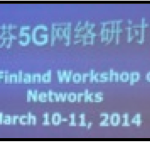
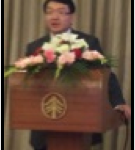

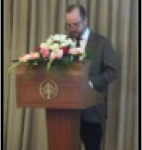

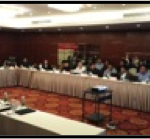
China-focused EduTech Business Ecosystem Workshop
Education is a focal area in China-Finland cooperation and to better synchronise activities and boost the impact of cooperation, the ”Sino–Finnish Learning Factory” (SFLF) initiative has been prepared under the direction of the Finnish Ministry of Education and Culture together with a team of experts from companies, research institutions and organisations. The initial areas suggested for the SFLF initiative include: learning research, teacher training and learning solutions, i.e. technology, services, and content ranging from kindergarten to primary, secondary and higher education and to vocational and professional education. When preparing the SFLF initiative, Digile as the Coordinator of China-Finland ICT Alliance has been invited to facilitate the cooperation of education technology and services companies, including related piloting and research. The preparation of EduTech business ecosystem started by Digile in 2013 together with those companies that were interested in education technologies and services area, under a theme “Education-as-a-Service”.

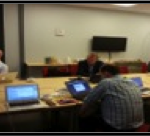
The second pilot was outlined by Mr. Ari Ketola, Context Learning Finland, Mr. Pentti Mero, Airport College, and Mr. Esa Tervo, Neoxen. It focuses on professional and corporate training, on transport and logistics in particular, targeting e.g. airport professional training. Mr. Mika Martikainen, Skilltize, described their offering in real-time online training and tutoring, with an initial focus on languages (English and other) and mathematics. Synergies were identified among these two pilots in planning and potential for a few additional pilots to be specified during the planning process. It has also become obvious that there is an interest among the partners to involve research centers in the EduTech cooperation model. A Research forum for education technologies and services focus area within ICT Alliance is now in active planning.
Focus area: Intelligent Sensing and Services for Traffic and Mobility in Urban Environment
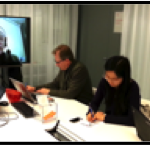
Focus area: Elderly Services and Smart Home
In the ICT Alliance context, there has been an interest among a group of universities and companies to develop cooperation that would more actively link the areas of elderly services, personal health and wellbeing and smart home together. A “Home-as-a-Service Platform” concept has been introduced by Digile as a potential framework to bring together related activities in these complimentary areas. For example, a “Home based personal services for elderly” concept is being developed by Active Life Village and its partners in close cooperation with cities, such as the City of Espoo.
Elderly services and smart home solutions will be discussed in Beijing in early May 2014 in an international cooperation meeting hosted by the Beijing Academy of Science and Technology (BJAST), a key ICT Alliance partner in this area, involving also Fraunhofer IAO and representatives from Taiwan and Korea. Dr. Matti Hämäläinen, as the ICT Alliance representative, will also join the “3rd China International Senior Services Expo” (CISSE 2014) that is the main event in this field. This trip will also include visits to Zhongguancun Z-Park and Life Science Park for extending cooperation in these areas (these events coincide with the planned visit of Minister for Social Affairs and Health, Paula Risikko, in Beijing at the same time).
Hanasaari Forum on Nordic Education, Exporting Education Knowhow and China Cooperation


Focus area: Environmental Monitoring (Air Quality)
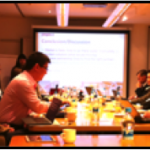
Pure Finland 2014 – High-level Events in Beijing in Autumn 2014

- “Coolest brands from Finland”, September;
- “Destination Finland”, 23-25 October;
- “Innovation Finland”, 25-27 November; and
- “Creative Finland”, December.
Jani Kaarlejärvi Appointed an Advisory Board Member in the European Commission funded CHOICE project on EU-China cooperation on ICT R&D&I
Through its objectives, the CHOICE project creates a bridge towards Horizon 2020 to shift away from technology-driven towards innovation-driven ICT R&D based on societal and consumer needs:
• Identify obstacles to reciprocity and encouraging a more balanced ICT R&D&I relationship with China based on reciprocity, supporting European nationals, companies and organisations willing to access Chinese research programmes;
• Highlight and showcase European and Chinese excellence in ICT R&D; and
• Strengthen EU-China industrial ICT R&D cooperation, also with the view of preparing the ground for new upcoming rules governing EU-China ICT R&D cooperation under Horizon 2020.

Next Activities and Actions
- China-Finland ICT Alliance new initiative meetings in Shanghai, Beijing and Wuhan, 7-17 April
- Cooperation meetings on Elderly Care Services and “Smart Home for elderly”, 3-9 May, Beijing
- China-Finland ICT Alliance new initiative meetings in Shanghai and Beijing, June
- ICT Alliance Research Forum on Intelligent Sensing and Services in Urban Environment for Traffic and Mobility (ISSUE-TM) during the 10th ITS European Congress, 16-19 June, Helsinki
- International Conference on Management Science and Engineering (21th) (ICMSE2014) in cooperation with eBEREA network, 17-18 August, Helsinki
- Finnish-Chinese Workshop on Analysis of Social Media, University of Tampere, 6-13 August, Tampere
- Pure Finland, “Coolest brands from Finland”, September, Beijing
- Shanghai Design Week, 13.-17.10.2014, Shanghai
- Radical Design Week, 16.-25.10.2014, Shanghai
- Pure Finland, “Destination Finland”, 23-25 October, Beijing
- Pure Finland, “Innovation Finland”, 25-27 November, Beijing
- Pure Finland, “Creative Finland”, December, Beijing
More Information on China-Finland ICT Alliance and Digile
For more information, please visit the China-Finland ICT Alliance website www.ictalliance.org, Digile website www.digile.fi and http://www.digile.fi/DIGILEintro or contact Dr. Matti Hämäläinen and Dr. Jani Kaarlejärvi (firstname.lastname@digile.fi).
